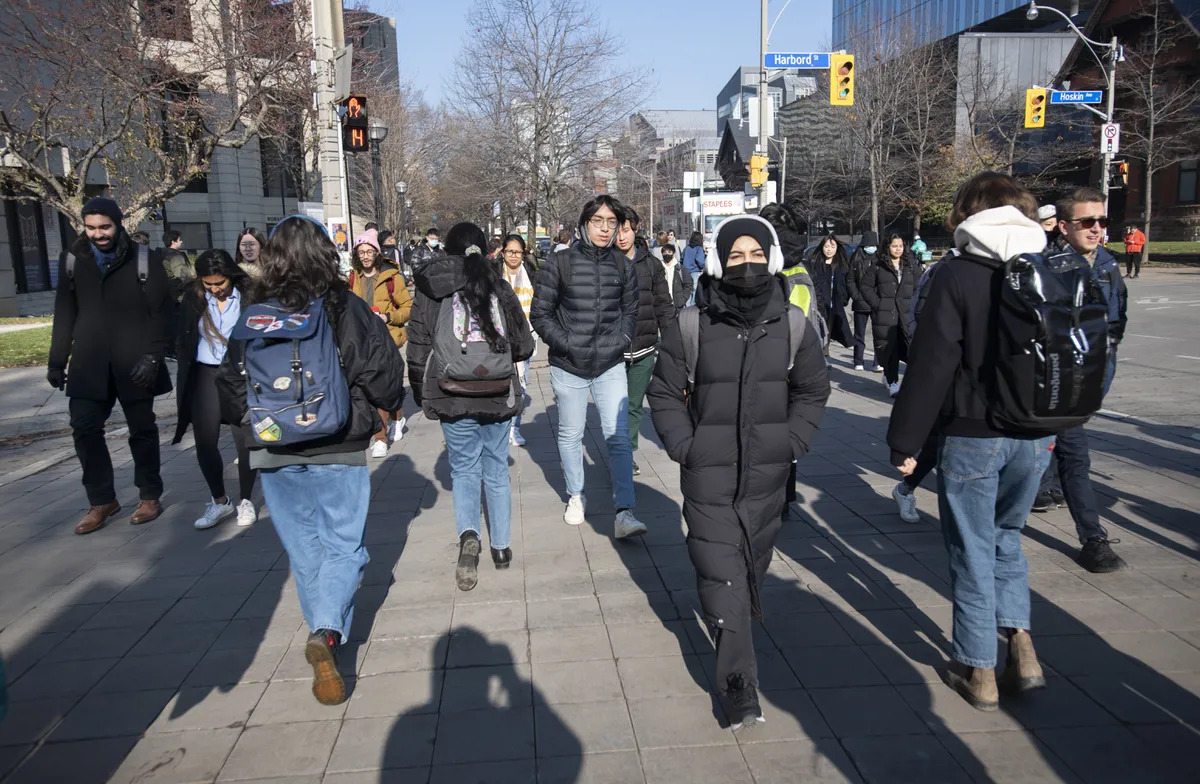
Students walk along St. George Street near the University of Toronto on Nov. 23, 2022. FRED LUM/THE GLOBE AND MAIL
The number of foreign students applying to come to Canada each year is forecast by the federal immigration department to rise to 1.4 million by 2027, an internal policy document says, which also raises concerns that such growth is “unsustainable.”
Immigration, Refugees and Citizenship Canada forecast the rapid rise in the number of foreign students in a paper last month about establishing a class of “trusted” universities and colleges, which would qualify for faster processing of international student study permits.
The document, obtained by The Globe and Mail, says that from 2019 to 2022 study permit applications for overseas students have increased by nearly 300,000 a year.
“By 2027, volumes are forecasted to nearly double to 1.4 million applications per year,” it says.
The federal document was sent to a select group of universities and colleges taking part in a pilot to establish the proposed trusted-institutions framework.
The IRCC paper forecasts that applications from foreign students will reach 949,000 this year, and just over one million next year. The number is projected to rise to 1.1 million in 2025, 1.28 million in 2026 and 1.4 million in 2027.
It says a recent strategic immigration review – and a continuing review of the international students program – has raised a number of concerns including “unsustainable growth in application volumes, impacting education quality, community infrastructure, and IRCC processing capacity.”
The paper says that the rapid growth in the intake of foreign students “has disrupted processing times” for study permits to enter the country. Meanwhile universities and colleges have become “increasingly dependent” on international students for revenue, in some cases not providing international students with “a positive education experience in Canada.”
It is currently piloting metrics to determine which universities and colleges are eligible to be counted as trusted institutions. To qualify they would have to share data annually with the immigration department, including the number and percentage of international students living in university housing.
Alex Usher, founder of Higher Education Strategy Associates, said on-campus housing is often not the cheapest option and this measure could reward universities attracting the wealthiest international students.
Housing Minister Sean Fraser – the former immigration minister – floated the prospect of a cap on international student numbers at the cabinet retreat in Charlottetown last month, saying the number of foreign students is putting pressure on rental markets and driving up costs. Immigration Minister Marc Miller said at the retreat that around 900,000 students are expected to enter Canada this year.
A Senate report on Canada’s international student program, published Wednesday, said that many international students are forced to live in crowded, sub-standard housing, with universities failing to provide them with accommodation, even though they pay far higher tuition fees than Canadian students and inject around $22-billion into the economy each year.
One of the report’s authors, Senator Hassan Yussuff, questioned assertions that international students are to blame for the shortage of affordable housing, saying that many are living in cramped and overpriced accommodation with little protection from avaricious landlords.
The Senate report quoted findings by Statistics Canada that 40 per cent of study permit holders live in unsuitable accommodation compared with 9 per cent of the rest of Canada’s population.
“Housing supply and affordability are a decades-old problem that cannot be solved by putting the burden principally on international students,” the report said.
It said that reducing international student numbers will reduce housing demand although the benefits would vary in different parts of the country and depend on the “tenancy preferences of Canadians.”
The Senate report said 51 per cent of international students settle in Ontario, with 20 per cent in B.C., and 12 per cent in Quebec.
The report added that the number of foreign students coming to Canada could be affected by diplomatic disputes with India and China, the “top international source countries.”
The IRCC, in assessing whether universities and colleges qualify as trusted, will gather information from government of Canada databases, such as on the “rate of adverse outcomes for study permit holders” –including convictions of international students for crimes in Canada. Ottawa will also check the approval rate of study permits to attend an institution.
It will also assess the “average teacher-student ratio” for the most popular courses taken by international students, retention and completion rates, foreign students’ ability to speak English or French, and the proportion of students who transition to permanent residency in Canada.
It says following the pilot, universities and colleges would be able to apply and the trusted institutions system could be up and running by spring next year. Foreign students applying to attend colleges and universities on the approved list could “receive expedited processing for the 2024 academic session.”
MARIE WOOLF
The Globe and Mail, September 20, 2023
